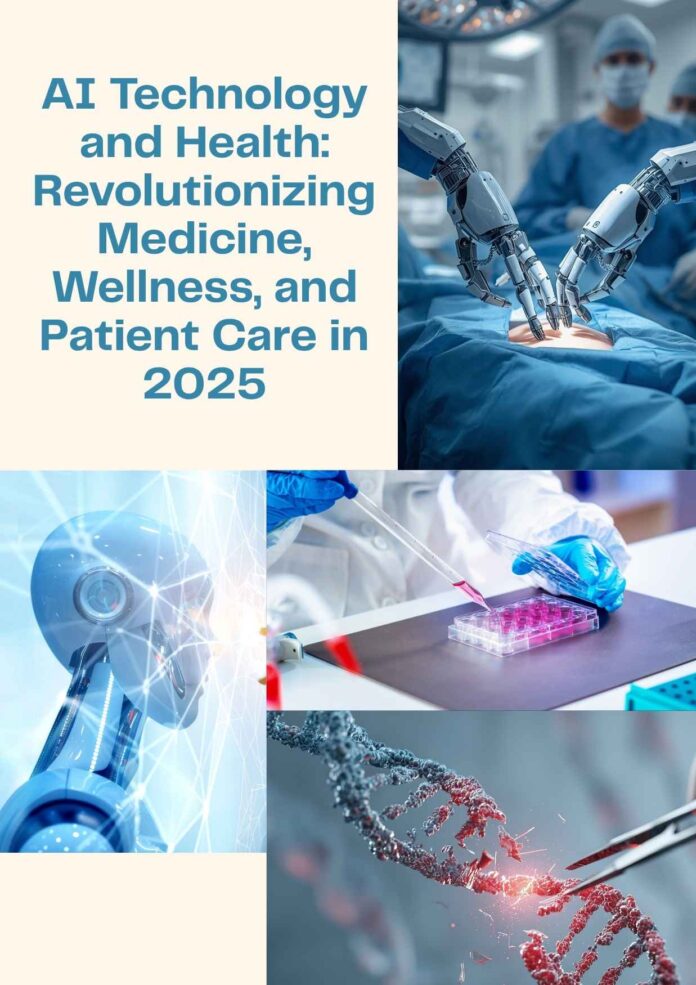Artificial Intelligence (AI) is no longer a futuristic concept- it’s actively transforming the healthcare industry. From early disease detection to personalized treatment plans and virtual health assistants, AI technology and health are merging to improve outcomes, reduce costs, and empower both clinicians and patients. In 2025, this synergy has reached unprecedented momentum, offering scalable solutions to some of healthcare’s biggest challenges.
Whether you’re a medical professional, a tech enthusiast, or simply curious about how AI impacts your well-being, this in-depth guide explores how AI in healthcare is reshaping medicine and why you should care.
1. AI-Powered Diagnostics: Faster, Smarter, and More Accurate
One of the most impactful applications of AI in health is diagnostic imaging. Algorithms trained on millions of medical images can now detect anomalies with astonishing precision.
- Examples in Practice:
- AI for cancer detection: Tools like Google Health’s DeepMind and IBM Watson can identify early-stage tumors in mammograms and lung scans more accurately than some human radiologists.
- Retinal screening: AI systems analyze retinal photographs to detect diabetic retinopathy, a leading cause of blindness, often before symptoms appear.
These systems don’t replace doctors but augment their capabilities—enabling earlier interventions and saving lives.
2. Personalized Medicine Through Machine Learning
No two patients are the same—and AI is making personalized treatment a reality.
Machine learning models analyze genetic data, lifestyle factors, and medical history to recommend tailored therapies. For instance:
- Oncology: AI platforms match cancer patients with the most effective clinical trials or targeted medications based on their genetic profile.
- Chronic disease management: Algorithms predict flare-ups in conditions like asthma or heart failure, enabling proactive care adjustments.
This shift toward precision health reduces trial-and-error prescribing and improves treatment efficacy.
3. Virtual Health Assistants and Chatbots: 24/7 Patient Support
AI-powered virtual assistants are becoming frontline tools in patient engagement.
- Platforms like Mayo Clinic’s symptom checker and Ada Health use natural language processing (NLP) to guide users through symptom assessment.
- Hospitals deploy AI chatbots to manage appointment scheduling, medication reminders, and post-op care instructions—reducing administrative burden and improving adherence.
These tools enhance accessibility, especially in underserved or rural areas with limited healthcare infrastructure.
4. Drug Discovery and Clinical Trials Accelerated by AI
Traditionally, drug development takes 10–15 years and costs billions. AI is dramatically shortening this timeline.
- Companies like Insilico Medicine use generative AI to design novel drug molecules in days not years.
- AI analyzes electronic health records (EHRs) to identify eligible patients for clinical trials, speeding up recruitment by up to 30%.
This acceleration is critical during public health emergencies-such as pandemics where time is of the essence.
5. Predictive Analytics for Preventive Care
Prevention is better than cure-and AI excels at predicting health risks before they escalate. By analyzing real-time data from wearables (like Apple Watch or Fitbit) and EHRs, AI models can:
- Forecast risk of heart attacks or strokes
- Detect early signs of mental health decline (e.g., depression or anxiety through voice and typing patterns)
- Alert caregivers to potential falls in elderly patients
This proactive approach shifts healthcare from reactive to preventive—a cornerstone of value-based care.
6. Ethical Considerations and Challenges
While AI’s potential is immense, it’s not without risks:
- Data privacy: Sensitive health data requires robust cybersecurity and HIPAA-compliant systems.
- Bias in algorithms: If training data lacks diversity, AI may underperform for minority groups.
- Regulation: Agencies like the FDA are developing frameworks to ensure AI tools are safe, transparent, and clinically validated.
Responsible AI deployment must prioritize equity, transparency, and human oversight
Conclusion: The Future Is Collaborative
AI technology and health aren’t just buzzwords—they represent a paradigm shift toward smarter, more compassionate, and efficient care. In 2025, the focus is on human-AI collaboration: empowering clinicians with intelligent tools while keeping patients at the center.
As AI continues to evolve, staying informed is crucial. Whether you’re a provider adopting AI tools or a patient benefiting from them, the future of health is being coded today one algorithm at a time.
Call to Action
Have you experienced AI in your healthcare journey? Share your thoughts in the comments below!
Subscribe for more insights on digital health, AI innovations, and the future of medicine.




